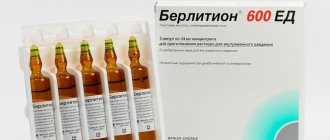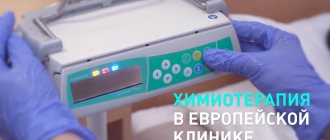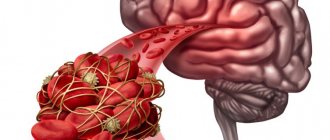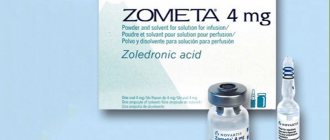- November 20, 2018
- Other drugs
- Inna Makagon
The drug is a product that has an antioxidant effect on the body. In addition, the medication regulates the metabolism of carbohydrates and fats.
The medicine is produced in the form of a concentrate for the preparation of a solution for intravenous administration. Berlition 600 does not have 10 ampoules per package; the drug is sold from pharmacies only 5 pieces per box.
"Berlition 600" is a yellow-green solution. The main active substance of the drug is considered to be thioctic acid (600 units in one ampoule); ethylenediamine and water are additional microelements.
Pharmacological actions
The main active component of the drug is considered an antioxidant, the effect of which is aimed at binding free radicals that provoke the occurrence of malignant tumors. Under the influence of the medication, the level of glucose in the blood decreases, carbohydrate and fat metabolism are stabilized, and cholesterol returns to normal.
The drug has a pronounced antioxidant effect on the body, which improves blood circulation through the capillaries, stabilizes the functioning of the liver and increases the protective properties of hepatocytes.
Thioctic acid eliminates the effect of alcohol toxins on liver cells and human internal organs in general, and also reduces the likelihood of hypoxia and ischemia, eliminates pain, paresthesia, numbness of the legs and arms.
Instructions for use
Instructions are attached to Berlition, regardless of its release form. The manufacturer provides a detailed description of the composition of the drug, the features of its interaction with drugs of other categories, pharmacological properties and the principle of its effect on the body. A separate paragraph contains information about possible side effects and contraindications. The regimen for using the solution or tablets recommended by the manufacturer can be changed by the attending physician.
pharmachologic effect
Berlition has hypocholesterolemic, hypoglycemic and hypolipidemic effects. The drug is a hepatoprotector. The active ingredient in the medication helps normalize the metabolism of certain substances that play an important role in the functioning of the liver. The effect on the organ occurs at the cellular level.
Additionally, the drug enhances liver protection from the adverse effects of external and internal factors.
Properties of the drug:
- increased levels of hepatic glycogen;
- elimination of toxic effects on the liver;
- decrease in plasma glucose levels;
- acceleration of the process of restoration of membrane structures in cells;
- improvement of the general condition of the liver and its functioning;
- destruction of free radicals;
- normalization of cholesterol metabolism;
- reduction of insulin resistance;
- normalization of energy metabolism;
- increased microcirculation;
- improvement of phospholipid biosynthesis;
- antioxidant effect;
- reduction of swelling of nervous tissue;
- improvement of endoneural blood flow;
- mitigation of existing negative symptoms;
- implementation of neurotrophic activity.
Indications for use
Berlition has a stimulating effect on the metabolic process in the body. This effect makes it possible to increase the effectiveness of therapy for various liver pathologies. The main indications for prescribing this drug are polyneuropathy of an alcoholic or diabetic nature. Additionally, Berlition is used in the treatment of fatty liver, steatohepatitis of various etiologies and chronic intoxication of the body.
Directions for use and dosage
The regimen for using Berlition can be prescribed on an individual basis (if there are special indications). In most cases, experts take as a basis the manufacturer’s recommendations specified in the instructions.
When treating with this drug, it is necessary to follow the dosage, avoid overdose and monitor the body’s reaction.
If signs of adverse symptoms appear, taking pills or injections should be stopped.
Application scheme:
- Berlition is taken in the form of tablets once a day (taken in the morning half an hour before eating, in some cases the dosage can be increased to two tablets per day);
- the concentrate is diluted with sodium chloride solution and administered dropwise (250 ml over thirty minutes);
- the use of infusions in most cases is combined with the subsequent administration of Berlition tablets (procedures can be carried out for a maximum of four weeks).
Release form and composition
There are two forms of release of Berlition - injection solution and tablets. In the first case, the drug is a concentrate for preparing a composition for infusion. The liquid has a greenish tint and is packaged in ampoules. One cardboard tray can contain 5, 10 or 20 ampoules. Yellowish tablets are placed in blisters (3, 6 or 10 pieces in one cardboard box).
The active ingredient in different formulations of the drug is thioctic acid. In solution, this substance is supplemented with water for injection and propylene glycol.
Auxiliary components in tablets:
- magnesium stearate;
- hydrated silicon dioxide;
- lactose monohydrate;
- croscarmellose sodium;
- MCC;
- povidone.
Interaction with other drugs
If the patient has diabetes mellitus, it is recommended to monitor blood glucose levels during treatment with Berlition. If the patient is prescribed iron or magnesium supplements, they should be taken in the afternoon.
Medicines containing alcohol should be avoided during therapy. Such drugs can neutralize the effect of Berlition.
Interaction Features:
- enhancing the effect of insulin and hypoglycemic drugs;
- decreased effectiveness of Cisplatin;
- Do not take the drug in combination with Ringer's solution (as well as solutions of glucose, dextrose, fructose).
Indications
According to the instructions for use, Berlition 600 mg ampoules are prescribed to people to eliminate the following conditions:
- Disturbance of carbohydrate-fat metabolism.
- Diabetic polyneuropathy (a disease that is considered a complication of diabetes mellitus and occurs when the level of glucose in the blood is significantly higher than the standard).
- Alcohol poisoning.
- Polyneuropathy due to alcohol intoxication (multiple damage to peripheral nerves, manifested by peripheral flaccid paralysis, sensory disturbances, trophic and vegetative-vascular disorders mainly in the distal limbs).
- Severe liver damage.
special instructions
Impact on driving vehicles and operating machinery
Caution is advised. No specific reaction studies have been conducted.
Pregnancy and lactation
The drug is contraindicated for use.
Use in childhood
Not used in pediatric practice.
In case of liver dysfunction
The drug is used to treat the liver.
If kidney function is impaired
No data noted.
Conditions for dispensing from pharmacies
On prescription.
How to take the drug correctly?
Berlition 600 ampoules are intended for the production of a solution for intravenous infusion. The drug can be diluted with strictly physiological sodium chloride solution.
Depending on the prescription and the general health of the patient, the doctor individually selects the dosage of the drug and determines the duration of treatment.
According to the instructions, adults with severe diabetic polyneuropathy are prescribed one ampoule of the drug per day. For severe liver diseases, people are prescribed two ampoules per day, that is, 1200 milligrams of thioctic acid.
The duration of treatment with the drug is no more than one month, after which the person, if necessary, is transferred to further therapy with Berlition tablets.
During drip administration of the medication, the patient must be constantly under the supervision of a doctor, since anaphylactic shock, general weakness or other unpleasant phenomena may occur during treatment.
People suffering from diabetic polyneuropathy, when treated with Berlition 600 ampoules, should constantly measure blood glucose and, if necessary, adjust the daily dosage of hypoglycemic drugs.
Price
Average price in Russia
The cost of one package of Berlition in Russian pharmacies is 560-900 rubles (in the form of a concentrate, the drug is more expensive than tablets).
Average cost in Ukraine
In Ukrainian pharmacies the price for one package of Berlition is approximately 276-400 hryvnia.
- If you have any symptoms of the disease, you should immediately consult a doctor. You can view a list of gastroenterology clinics on our website
- You will be interested! The article describes symptoms that make it possible to suspect the presence of liver disease in the early stages
- You will also be interested in learning more about the treatment of various diseases of the gastrointestinal tract
Side effects
During therapy with Berlition 600 ampoules, people may experience certain negative reactions:
- Unpleasant taste in the mouth.
- Diarrhea (a pathology in which a person experiences frequent bowel movements, and the stool becomes liquid).
- Intestinal obstruction.
- Flatulence (excessive accumulation of gases in the intestines).
- Feeling of heat in the head.
- Migraine (a neurological disease characterized by episodic or regular and painful headaches).
- Diplopia (a common visual impairment characterized by the formation of two images instead of one when viewing objects).
- Development of convulsive syndrome.
- Pain in the heart area.
- Dyspnea (breathing disorder, which is accompanied by a change in its frequency and depth).
- Tachycardia (increased heart rate from 100 beats per minute).
- Hyperhidrosis (a common pathological condition characterized by increased sweating).
- Urticaria (an allergic disease characterized by the formation of blisters on the skin and mucous membranes).
- The development of angioedema (an acute condition characterized by the rapid development of local edema of the mucous membrane, subcutaneous tissue and the skin itself).
- Anaphylactic shock (an acute pathological condition that occurs when the allergen re-penetrates, resulting in severe hemodynamic disturbances and hypoxia).
- The development of hypoglycemia (a pathological condition associated with abnormally low levels of glucose in the blood).
- Difficulty breathing.
- Paresthesia (one of the types of sensitivity disorder, characterized by spontaneously occurring sensations of burning, tingling, crawling).
Analogs
When selecting Berlition analogues, it is necessary to compare the compositions of the drugs and pay attention to the special marks of the manufacturers. If the medication provokes side effects, then only a specialist should search for substitutes.
Some analogues have completely identical pharmacological properties, but are inferior to Berlition in cost.
| Examples of analogues | Description |
| Thiolipon | the drug binds free radicals, eliminates the effects of toxic effects on the liver, is used in the treatment of polyneuropathy of various etiologies, the approximate cost is 380 rubles. |
| Neurolipon | the medication normalizes the functioning of the liver, reduces the concentration of glucose in the blood, eliminates the effects of toxic effects on the body, belongs to the group of endogenous antioxidants, the approximate price is 280 rubles. |
| Octolipen | a hepatoprotective agent with hypoglycemic, hypolipidemic and hypocholesterolemic effects, available in the form of tablets, injection solution and concentrate, not only improves the condition of the liver, but also eliminates the consequences of toxic effects, average cost 360-600 rubles. |
| Dialipon | a drug with antioxidant and antitoxic effects, improves metabolic processes, restores some liver functions, the drug can be used for patients with diabetes, the average cost is 560-600 rubles. |
Overdose
When a large dose of medicine is infused into a person, poisoning quickly occurs, which is characterized by increased adverse reactions. In addition, patients experience irritability and increased psychomotor agitation. If too large dosages of the solution are administered, a person may experience severe intoxication, including coma or death.
The severity of signs of drug poisoning increases when the injection solution is used together with Berlition tablets, as well as when the drug is used simultaneously with ethanol.
If signs of poisoning occur, the patient should be hospitalized immediately. Therapy for thioctic acid poisoning involves the use of enterosorbents and symptomatic treatment.
Side effects
If the body is hypersensitive to thioctic acid, side effects may occur after using Berlition. Negative symptoms manifest themselves in the form of nausea, headache, diarrhea or changes in taste. In some cases, the drug provokes tachycardia, convulsions, blurred vision, dyspeptic reactions and chest pain.
Hypersensitivity to the medication can also cause an allergic reaction (redness of certain areas of the epidermis, rash and itching).
Other possible side effects:
- diplopia;
- difficulty breathing;
- feeling of heaviness in the head;
- hemorrhages in the skin.
Overdose
Exceeding dosages of Berlition provokes the occurrence of side symptoms. Their intensity depends on the individual characteristics of the body and the level of overdose. If headache or nausea occurs after taking the medication or infusion, further therapy with this drug is discontinued.
Other manifestations of side effects are eliminated by symptomatic treatment.
Severe overdose symptoms:
hemolysis of red blood cells;- acidosis;
- convulsive conditions;
- hypoglycemic coma;
- psychomotor agitation;
- necrosis of skeletal muscles;
- disruption of brain function;
- DIC syndrome.
Contraindications
Berlition is not used in pediatric practice. Age under eighteen years is a contraindication for the use of this drug. During pregnancy and lactation, the medication is prohibited for use. In these categories of patients, Berlition can provoke a negative reaction of the body to the active ingredient.
It is prohibited to take the drug if you have the following conditions:
- childhood;
- pregnancy and lactation;
- individual intolerance to the drug;
- sugar intolerance.
During pregnancy
Thioctic acid contained in Berlition can have a negative effect on the body of a newborn baby and fetus. This nuance is the basis for prohibiting the use of the medication during pregnancy and lactation.
If it is necessary to use hepatoprotective agents, these categories of patients are prescribed specialized drugs containing safe components in their composition.
Interaction
During therapy with Berlition 600 ampoules, it is prohibited to use drugs that contain ethanol, and drinking alcoholic beverages is also prohibited. This can lead to severe intoxication and drug poisoning.
When treated with medication, there is an increase in the pharmacological effect of hypoglycemic drugs, so people with diabetes need to adjust the daily dosage of drugs.
After injecting the medicine intravenously, a person should not consume dairy products, as well as medications containing calcium, magnesium or iron, for another eight hours. The combination of these substances with thioctic acid leads to the formation of complex compounds that can disrupt the functioning of the liver and kidneys.
Reviews
Reviews of Berlition are in most cases positive. The drug improves the general condition and neutralizes some symptoms of pathological processes in the liver. The drug acts at the cellular level and normalizes the performance of certain types of tests. Negative reviews are associated with the lack of therapeutic effect of the medication. Such consequences are possible with an incorrectly designed course of therapy.
If you have experience using Berlition, be sure to share it with other site visitors.
Analogs of Berlition 600 ampoules
The following medications are considered similar in composition and pharmacological action to Berlition 600:
- "Alpha lipoic acid."
- "Tiolipon".
- "Tiogamma".
- "Octolipen".
- "Tiolepta".
- "Korilip."
- "Espa-lipon."
- "Neurolipon".
Before replacing the original drug, you should consult a medical specialist.







